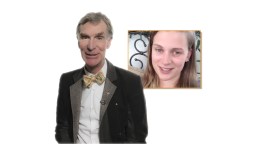Today’s #TuesdaysWithBill question deals with the unending conflict between science and religion. How does someone who has grown up indoctrinated with religious thinking break the old mold and learn to embrace science and reason?
It’s important to adopt a critical approach to life and familiarize oneself with skeptical thinking. Stick to the facts. Evaluate claims. Judge for yourself whether the things people say are truly steeped in reason, or if it’s all just wool over your eyes. These mindsets take time and effort to develop, so don’t get discouraged if you don’t become a totally rational, skeptical thinker on day 1.
All that said, there is one thing Bill cannot stress enough though: Do not confuse skepticism with cynicism. See what he means in the video above.
Andrew LaRue: Hey Bill. I’m Andrew LaRue. I’m from northwest Ohio. Thanks for taking my question. My question is where — I’ve been indoctrinated with religion most of my life and I am 20 years old right now and I’m just kind of opening my mind up to what I’ve learned from science. And I’m just kind of wondering kind of by reeducating myself because religion is all I’ve really ever known. So I’m just looking to start over. Thank you.
Bill Nye: Andrew, this is a heavy question. How should you deal with science and religion? And what I tell everybody by analogy: When you learn about what we in science-education like to call skeptical thinking or critical thinking, where when someone says, "I have the ability to communicate with the dead," for example. At first you go wow really? And then they show you the evidence, which is you in a dark room and they hold hands and a ghost appears in the corner and you hear hissing sounds — shhhh, shhhh. If you’re led to believe that they’re ghosts, at first that seems quite reasonable to you. But after you start thinking about it skeptically, you go, "That’s probably a guy with a handkerchief on a stick and a steam kettle making hissing sounds probably." Which is what Houdini did by the way. So you come to abandon or change what you were brought up believing not in a moment, not in a revelatory instant, but over the process of many months and years.
So I encourage you, when it comes to religion, is to evaluate the claims which is a big thing in skeptical and critical thinking. Somebody claims that he— it was through his mind that he was able to get the tide to go extraordinarily low at the Red Sea. It could be. It could be, but there may be other explanations. It could be that when a football player or a baseball player in the U.S. has a successful play, hits a double in a critical point in a baseball game, scores a touchdown at an opportune moment — it could be that there is a divine spirit that enables this person to do this extraordinary thing at that moment. Or it could be that the person has been practicing this for years and years and years and he was at the right place at the right time and caught the ball or hit the ball or what have you. Both are explanations for you to evaluate.
The big thing is when it comes to ethics and morals and religion, to see if there’s anything different between what religions want you to do and what you feel you should do. What you think is ethically innate within you. For most people, most people are not inclined to murder people. But certain religions quite reasonably have rules against that. It’s antisocial. See if that comes from within you or it comes from outside of you — from without you. And then evaluate each claim and don’t beat yourself up. To become — I’m not talking about religion. I’m talking about to be skeptical of astrology, be skeptical of extraordinary magic tricks, to be skeptical of faith healing, to be skeptical of crop circle origins. These things, it takes a way of thinking that you don’t develop in an afternoon. You’ve got to let them steep to turn over in your mind. But I hope you do a lot of it and all the time you spend on thinking about these thoughts will lead you somewhere. Now I don’t know exactly what you were brought up with, but if you’re in Ohio it’s very reasonable you’re in the Ohio River Valley. You were probably brought up with a lot of the Bible. I really encourage you to read the bible. Just read it and see if it all — see if it seems to be literally true to you. And they had some extraordinary penalties for crimes that or for perceived misdeeds that — modern penalties aren’t as severe. And there might be good reasons for that. If you’re in a small tribe, survival is a big deal and you’ve got to think fast and take swift action. Now after many centuries of reflection, our society has very different approaches to some of these deeds that are described — if the Bible is what you’re brought up with. You might be brought up with something else.
But just remember: Don’t beat yourself up. But get into skeptical thought. Check out skeptical websites and do not — be careful because there are English words that come to us from Greek. Do not confuse skepticism with cynicism. Those are two different things. Cynical means you don’t have any expectation of good outcomes. Skeptical means you want things to be proven or shown. They’re two very different things, but because the words come to us from Green and we merge or blend the consonant and vowel sounds, they sound very much alike to us. But they are two different things skepticism and cynicism. It’s a cool question man. Good luck.






